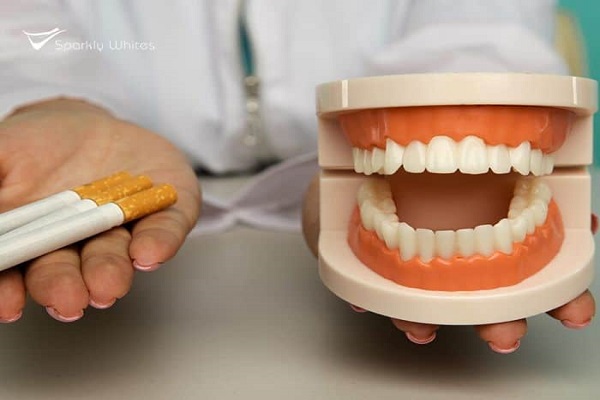
For smokers, maintaining optimal oral health can feel like a constant uphill struggle. Nicotine, tar, and other harmful chemicals found in cigarettes wreak havoc on teeth and gums, leading to a host of complications, including premature wrinkles around the mouth. When it comes to dental implants, smokers face additional hurdles, such as slower healing times, diminished bone density, and an increased risk of infection. These factors can complicate treatment and lead to long-term health issues.
But all is not lost. Despite these challenges, advancements in dental care have opened up alternative solutions for smokers who find quitting difficult. At Sparkly Whites, we recognize the unique struggles smokers face in maintaining dental health. In this article, we’ll explore the challenges smokers encounter with dental implants and provide alternative treatments that can help you achieve the healthy, radiant smile you deserve. And yes, we also offer top-up treatments for just £139 to help refresh your smile!
At Sparkly Whites, we offer personalized support every step of the way, ensuring our patients are well-informed and equipped with the best solutions for their specific needs.
Why Smoking Complicates Dental Implants
Dental implants rely on a strong, healthy jawbone to ensure long-term success. During the process of osseointegration, the implant fuses with the bone, creating a secure base. However, smoking can hinder this critical process by reducing blood flow and lowering oxygen levels, which interferes with your body’s natural healing abilities. This increases the likelihood of complications such as implant failure, infection, and prolonged recovery times.
Nicotine constricts blood vessels, making it harder for the body to deliver essential nutrients to the gums and bones. As a result, smokers experience slower healing, gum disease, high blood pressure, and even bone loss—all of which jeopardize the stability of dental implants. Additionally, the chemicals in tobacco can irritate the gums, making them more prone to infection and inflammation, further reducing the long-term success rate of implants.
This highlights the importance of Understanding Dental Health for Smokers. Studies show that smokers face a dental implant failure rate up to three times higher than non-smokers. For those already struggling with tooth loss, this can be a tough pill to swallow. But don’t despair—there are alternatives, strategies, and treatments available to navigate these challenges.
The Impact of Smoking on Dental Health
Before diving into the alternatives, let’s first understand how smoking affects oral health.
-
Gum Disease: Smoking impairs blood flow to the gums, weakening the tissue and increasing the risk of gum disease. Periodontal disease is a leading cause of dental implant failure.
-
Bone Loss: Smoking contributes to the deterioration of jawbone structure, making it more difficult to support dental implants.
-
Delayed Healing: Smoking reduces the body’s ability to heal efficiently, leading to longer recovery times and increased susceptibility to infections post-surgery.
-
Dry Mouth: Smoking reduces saliva production, leading to dry mouth, which can encourage bacterial growth and further damage teeth and gums.
Dental Implants: The Challenges Smokers Face
Dental implants are an excellent solution for missing teeth, providing a permanent and functional option. However, smokers face higher risks when considering implants. Studies have shown that smokers are 2-3 times more likely to experience implant failure than non-smokers.
Common Implant Challenges for Smokers
-
Peri-Implantitis: Smokers are more prone to developing peri-implantitis, a gum infection around the implant that can lead to inflammation and bone loss, ultimately jeopardizing the implant.
-
Inadequate Jawbone: Many smokers suffer from reduced bone density due to years of smoking, making it difficult to securely anchor implants.
-
Longer Healing Time: Smoking limits oxygen supply to the gums, slowing down the healing process and leaving smokers more vulnerable to post-surgical complications.
Alternative Solutions for Smokers Facing Dental Implant Challenges
While traditional dental implants may not always be the best option for smokers, several alternative solutions can offer similar aesthetic and functional benefits.
-
Mini Dental Implants Mini dental implants are less invasive and ideal for patients with low bone density. These smaller implants require less bone mass and have shorter healing times, making them a viable option for smokers. They come with a lower risk of infection and inflammation compared to traditional implants.
-
Removable Dentures Traditional dentures may not be as permanent as dental implants, but they are a practical solution for those who can’t undergo implant surgery. Custom-made and non-invasive, removable dentures don’t require strong jawbone support, making them suitable for smokers with bone loss.
-
Implant-Supported Dentures A hybrid solution, implant-supported dentures combine elements of both dentures and implants. These dentures attach to a few strategically placed implants, reducing the number of implants required and the associated surgical risks. However, smokers must address any gum disease or bone loss before proceeding with this option.
-
Bone Grafting For smokers determined to get dental implants, bone grafting can help strengthen the jawbone before implant placement. This procedure involves adding bone tissue to weakened areas of the jaw, providing a more solid foundation for implants. While it extends the treatment timeline, it increases the chances of success for smokers pursuing implants.
-
All-on-4 Implants The All-on-4 implant system is a popular choice for smokers with moderate bone loss. Using four strategically placed implants to support an entire arch of teeth, this method is less invasive and reduces the number of implants needed. Fewer implants mean fewer complications and a faster recovery time.
Improving Dental Health for Smokers
If smoking has already impacted your oral health, there are steps you can take to improve your dental hygiene and increase the chances of successful treatments.
-
Quit Smoking While quitting may be difficult, it’s the most effective way to improve oral health and reduce the risks associated with dental procedures. Quitting smoking can lead to healthier gums, faster healing times, and a reduced risk of infections.
-
Regular Dental Visits Smokers should visit their dentist more frequently to monitor gum health and catch any early signs of disease. Professional cleanings help remove tar buildup and reduce the risk of gum disease.
-
Good Oral Hygiene Practices Maintaining excellent oral hygiene is essential. Regular brushing, flossing, and using mouthwash can reduce plaque buildup, prevent infections, and slow down gum disease. Using toothpaste specifically designed for smokers can also help reduce discoloration and bad breath.
-
Stay Hydrated Since smoking leads to dry mouth, it’s important to stay hydrated by drinking water and chewing sugar-free gum. This helps stimulate saliva production and minimizes dry mouth symptoms.
The Role of Support Systems in Managing Dental Health
Managing dental health as a smoker doesn’t have to be a solo journey. Surrounding yourself with the right support system, including dental professionals and loved ones, can make it easier to adopt healthier habits and ensure long-term oral health. Accessing local stop-smoking services, such as NHS resources, can provide valuable guidance and alternative options like e-cigarettes and vape products.
Are Dental Implants Still Possible for Smokers?
Despite the challenges smokers face, dental implants are not entirely out of reach. With the right preparation, including addressing issues like gum disease and bone loss, dental implants can still be a viable option for smokers. At Sparkly Whites, our experienced team is dedicated to managing the specific needs of smokers, helping them achieve a healthy, functional smile.
